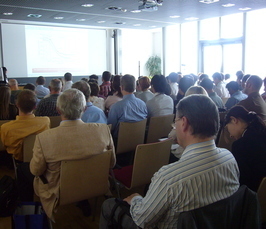ENTFÄLLT MPI Kolloquiumsreihe: Prof. Dr. Wolfgang Wiechert, From wild type microbes to industrial chassis organisms
ENTFÄLLT MPI Kolloquiumsreihe: Prof. Dr. Wolfgang Wiechert, From wild type microbes to industrial chassis organisms
- Datum: 18.05.2017
- Uhrzeit: 16:00 - 17:00
- Vortragende(r): Prof. Dr. Wolfgang Wiechert
- Head of Systems Biotechnology, Forschungszentrum Jülich
- Ort: Max-Planck-Institut Magdeburg
- Raum: Großer Seminarraum "Prigogine"

Das unten angekündigte Kolloquium am 18. Mai 2017 entfällt leider. Ein neuer Termin wird rechtzeitig bekannt gegeben. Wir bedanken uns für Ihr Verständnis.
Das Max-Planck-Institut Magdeburg lädt Sie herzlich zu seiner öffentlichen Kolloquiumsreihe ein. Hochrangige Wissenschaftler aus verschiedenen Fachgebieten, eingeladen vom Max-Planck-Institut Magdeburg, präsentieren ihre Forschungsarbeit.
Abstract Prof. Wiechert:
Wild type microorganisms evolved for surviving in a natural environment under dynamically changing conditions. When these organisms are used as platforms for biotechnological production processes, they have to perform in the artificial environment of a bioreactor. This means, that many natural functions are not needed anymore and environmental signals caused e.g. by bioreactor inhomogeneity might even lead to unwanted responses. The construction of “minimal organisms” as novel industrial platform organisms has become an important branch in Synthetic Biology. Both bottom up (de novo genome synthesis) and top down approaches (multiple gene knockouts) are taken. In analogy to the automobile industry, the result, also called a chassis organism, supplies basic functionality (metabolism, energy, reproduction) to support novel pathways that do not interfere with the existing cellular machinery.
The
talk focuses on experiences made with a genome reduction project for
the industrially relevant platform organism Corynebacterium glutamicum.
The genome was reduced by more than 15% without changing growth rate and
biomass yield. After explaining the general strategy of the project,
some expected and unexpected problems are highlighted. Particularly, the
term “minimal genome” cannot be unambiguously defined and is strongly
dependent on the intended applications of a chassis. It also will become
clear why a further reduction of the genome size will become
increasingly difficult. As a side effect, a genome reduction project is
an excellent approach to obtain a deeper understanding of gene function
on a systems level.